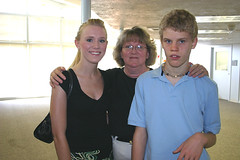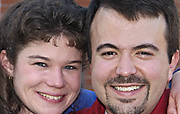(By Erik)
Ever since I was a kid, I’ve hated loud noises.
Pops, bangs, shouts and whistles — sudden, sharp sounds always make me jump and set me on edge. Getting through a Fourth of July fireworks display is still a bit of a challenge, pretty colors aside.
That’s partly why I’ve shied away from people that get lumped together in the broad category called “special needs.” A lot of churches have them — people with autism, Down syndrome, retardation. I just don’t do well with them, I’ve always thought.
And some of them make loud, sudden noises.
I remember a boy in the church where I grew up who had severe mental handicaps. He couldn’t communicate or even walk, but his parents faithfully brought him to church each week. He’d occasionally make these sort of loud, gurgle-type sounds that are hard to describe. I can still hear them if I think back.
I also remember wondering why his parents brought him to church. He clearly wasn’t getting anything out of it, and he was somewhat distracting (though I remember our minister deftly working one of this young man’s noises into a sermon once). It must’ve been hard for his parents to get him there every week, too.
I don’t think like that anymore, not after meeting another young man, Alex.
A missionary in Africa had contacted me about Alex, who was baptized not long ago at the Brentwood Oaks Church of Christ in Austin, Texas. Jeanie and I were headed down there for Karen Reynolds’ wedding (see previous posts) so we spent an extra night in Austin and attended the church’s special worship service for kids with special needs.
Alex is autistic. His mom told me the technical term for it — it’s long and vague. A lot of folks, myself included, get confused here because we equate autism with Dustin Hoffman in “Rain Man.” That’s a very narrow perspective of autism. It’s a huge spectrum of disorders — I think they even call it “autism spectrum disorder” now — that range from mild to severe.
A lot of people who society used to label as anti-social have a mild form of autism that’s been classified only recently. It’s called Asperger’s Disorder.
And autism is a lot more common than I thought. One out of every 116 children born in the United States has some form of it. For Down syndrome, the number is 1 out of every 800 births, according to the Centers for Disease Control.
Alex, like a lot of autistic children, is non-verbal. He only speaks a few words, but a therapist taught him how to communicate by pointing to letters on a piece of paper.
There’s another boy in at Brentwood Oaks, Jackson, who’s also autistic and communicates the same way. I talked to his mother on the phone, and she said that the conversations her son engaged in after he learned the point-and-spell method amazed her.
For example, in a recent group class for autistic kids, one girl asked the other students what they thought about Hamas. Jackson replied by spelling out “I can’t believe they won the election.” He went on to say that he wants peace in the Middle East and doesn’t support their brand of violence.
“And how old is your son?” I asked his mother.
“He’s nine,” she said. The family doesn’t even watch that much TV. As best as they can tell, Jackson has been reading the newspaper over his father’s shoulder.
The folks who teach the special-needs class at Brentwood Oaks are starting to realize that they need to modify their topics to include discussions of the Holy Spirit and other issues they once considered too complex for the students to grasp.
Taking care of kids with autism and other special needs is tough. It’s an around-the-clock job. Parents don’t get to worship together, and some have given up on church because it’s just too difficult to manage. That’s why Brentwood Oaks and other congregations have launched special programs for these kids.
They’re not easy to start. Brentwood Oaks brought in a therapist to work with the kids for the better part of a year — and to train the “pals,” volunteers who accompany the children to class. The volunteers told me that the first weeks of their program, now a year old, looked like a circus compared to today. But they kept training, and things got better.
Now the program is a magnet for people from different churches who have kids with special needs. Some people bring their kids to Brentwood Oaks just for the special-needs ministry. When Jeanie and I visited, one of the kids got picked up early so he could go to Buddhist temple with his parents.
Alex’s mother told me that one of the blessings her son has brought her is the realization that sometimes we have to accept help. We can pretend to be self-reliant all we want, but these kids — these very intelligent kids — remind us that we’re all reliant on God for everything. We all have special needs.
And we’re not all that different.
During the Brentwood Oaks class, we sang “If You’re Happy and you Know It.” We skipped the verse that goes, “If you’re happy and you know it shout ‘Amen!’ ‘AMEN!’”
One of the volunteers nodded toward one of the young, autistic students and told me why.
“He hates loud noises,” he said.
If you want to read the story I wrote for the Chronicle about special-needs ministries, click here
Wednesday, July 26, 2006
Subscribe to:
Post Comments (Atom)



2 comments:
Thank you for an insightful and informative post.
Shalom,
Bobby Valentine
http://stoned-campbelldisciple.blogspot.com/
Thanks very much for sharing your thoughts on special needs kids. I don't have any personal experience with autistic kids (or kids with any other handicap, for that matter), and I suspect they are a group whose needs have gone mostly unremarked-upon in many churches. What you've written brings tears to my eyes. Thanks for heightening my awareness a bit.
--Courtney
Post a Comment